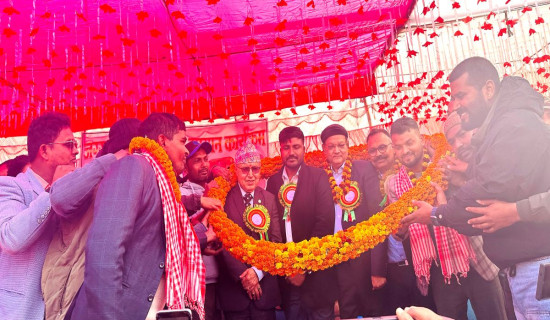- Friday, 26 December 2025
Call For Climate Justice
Nepal has successfully drawn the attention of the global community to the worst impact of climate change on its iconic Himalayas and demanded justice for the loss and damage it caused to the country. Addressing the 28th Conference of the Parties to the United Nations Climate Change Conference (COP28) in Dubai, UAE on Saturday, Prime Minister Pushpa Kamal Dahal Prachanda said Nepal was bearing a direct, disproportionate and damaging effect of climate change despite near zero contribution to global emissions. "Due to an appalling injustice inflicted on us, our people are severely affected by climate-induced disasters such as landslides, flash floods, wildfires, glacial lake outbursts, drought, etc."
The COP 28 offers a promising opportunity to Nepal to highlight the negative consequences of climate change and efforts made to mitigate them. As Prime Minister Prachanda began to speak, he set the tone with a clear message: 'mountains are tortured by rising temperatures.' Then, he moved on to highlight the importance of mountains for the survival and wellbeing of human beings. "Mountain is the foundation of human civilisation, ecosystem and biodiversity, so it must be protected." These powerful remarks have indeed struck a responsive chord with the attending audiences comprising of the heads of governments of states, think tanks, policy makers, climate scientists, business community and civil society members.
It is well-known that Nepal's snow-capped mountains have become the casualties of temperature rise and climate change on a large scale. An inter-governmental panel on climate change (IPCC) report has disclosed that a record number of climate-induced disasters are taking place in the Himalayan region. It has stated that one-third of glaciers have melted and warned that another one-third is feared to be lost by the end of this century. The loss of Himalayas means a serious threat to the livelihoods to millions of people living in the downstream areas. So this is a warning bell not just for Nepal but also the entire Hindu Kush Himalayan region and the mountains all over the world.
As a least-developed country, Nepal has little or no role in producing the greenhouse emissions. Instead, it has played significant role in fighting the global warming with focus on greenery and clean energy. The country has set nationally determined construction and climate action as per the Paris Accord to meet its commitment to achieve net zero emission by 2045, which is five years earlier than global ambition. It has also become a global model in the growth and preservation of forests, which cover 45 per cent land. Although its focus is on the optimum use of hydropower for clean energy, it is facing financial and technical constraints to implement the climate action.
Against this backdrop, Nepal has demanded doubling the climate finance pledge of 100 billion dollars by 2025 while simplifying operationalisation of the loss and damage fund. As the LDCs are the worst-hit by the climate impacts, they should be in the first priority in getting more predictable, adequate, and equitable resources and technologies to fight the climate change. While speaking at a high level talks on the mountains organsied by himself on the sidelines of COP 28, PM Prachanda called for the implementation of the Paris Agreement that seeks to limit the earth's temperature to 1.5 degrees Celsius. United Nations Secretary-General Antonio Guterres also addressed the programme and said that he had witnessed the impacts of climate change in the Himalayas and there was already a delay in tackling this crisis. Now it is up to the developed nations to fulfill their commitments to implement climate action. Now all nations should act in solidarity to overcome the climate crisis that has put the planet in peril.

















